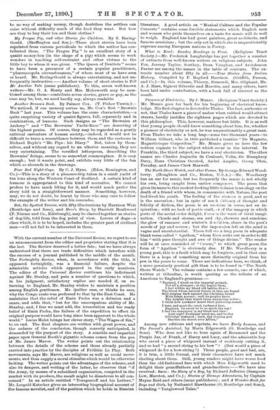With the current number of the Universal Review, we regret
to see an announcement from the editor and proprietor stating that it is the last. The Review deserved a better fate ; but we have always understood that there are trade difficulties which interfere with the success of a journal published in the middle of the month. The Fortnightly Review, when, in accordance with the title, it appeared fortnightly, was a financial failure, despite the admirable articles which appeared in the early numbers. The editor of the Universal Review continues his indictment against Mr. Stanley, and puts a number of questions to which, in his judgment, satisfactory replies are needed if, on re- turning to England, Mr. Stanley wishes to maintain a position among English gentlemen. Mr. Quilter sees, or thinks he sees, why the Congo route was preferred to that by the East Coast. He maintains that the relief of Emin Pasha was a delusion and a snare, and adds that, " but for the unscrupulous ability of Mr. Stanley, and, I fear we must add, the irresolution and too ready belief of Emin Pasha, the failure of the expedition to effect its original purpose would have long since been apparent to the whole world." Lucas Malet brings her clever story, " The Wages of Sin," to an end. The final chapters are written with great power, and the sadness of the conclusion, though scarcely anticipated, is demanded by the purport of the story. A sensible and impartial paper upon General Booth's gigantic scheme comes from the pen of Mr. James Mayor. The writer points out the relationship between the details of the scheme and those already partially carried into practice by the disciples of Frederic Le Play. Both movements, says Mr. Mayor, are religions as well as social move- meats, and thus supply a moral stimulus which would be otherwise lacking. The writer points out the advantages of the scheme, and also its dangers, and writing of the latter, he observes that "if the Army, by means of a subsidised organisation, competed in the market with its produce, the result might be disastrous to all con- cerned." In an article entitled " Tonrgenieff and his Letters," Mr. Leopold Katscher gives an interesting biographical account of the famous novelist, and of the position which he holds in Russian
literature. A good article on "Musical Culture and the Popular Concerts" contains some forcible statements which English men and women who pride themselves on a taste for music will do well to weigh. England has had great painters, great architects, and famous musicians ; but the only art in which she is unquestionably supreme among European nations is Poetry.


































 Previous page
Previous page